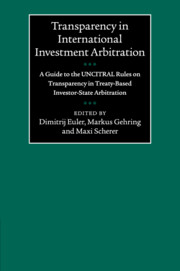 Transparency in International Investment Arbitration
Transparency in International Investment Arbitration Book contents
- Frontmatter
- Contents
- Contents
- List of contributors
- Foreword
- Acknowledgements
- Table of treaties, guidelines and rules
- Table of cases
- List of abbreviations
- 1 Introduction
- 2 Public interest in investment arbitration
- 3 Article 1. Scope of application
- 4 Article 2. Publication of information at the commencement of arbitral proceedings
- 5 Article 3. Publication of documents
- 6 Article 4. Submission by a third person
- 7 Article 5. Submission by a non-disputing Party to the treaty
- 8 Article 6. Hearings
- 9 Article 7. Exceptions to transparency
- 10 Article 8. Repository of published information
- 11 The application of transparency
- 12 Conclusion: The Rules as a swing of the pendulum?
- Index
2 - Public interest in investment arbitration
Published online by Cambridge University Press: 05 August 2015
- Frontmatter
- Contents
- Contents
- List of contributors
- Foreword
- Acknowledgements
- Table of treaties, guidelines and rules
- Table of cases
- List of abbreviations
- 1 Introduction
- 2 Public interest in investment arbitration
- 3 Article 1. Scope of application
- 4 Article 2. Publication of information at the commencement of arbitral proceedings
- 5 Article 3. Publication of documents
- 6 Article 4. Submission by a third person
- 7 Article 5. Submission by a non-disputing Party to the treaty
- 8 Article 6. Hearings
- 9 Article 7. Exceptions to transparency
- 10 Article 8. Repository of published information
- 11 The application of transparency
- 12 Conclusion: The Rules as a swing of the pendulum?
- Index
Summary
2.1 Absence of public interest in investment disputes
1. Investment agreements, either in the form of contracts or treaties, are problematic because the State agrees to exclude a dispute from its jurisdiction and instead offers investment arbitration. States accept this limitation because they believe arbitration to be one significant factor for foreign investors to assess where they intend to invest. Thus, the arbitration clause, in addition to other protections, shall attract investments and promote growth in the long run. In contracts, the dispute is defined under the arbitration clause. Treaties, however, are more problematic than contracts because States need to determine the term ‘investment’ related to unknown disputes in their investment treaty. The term is not defined under customary international law. Assuming that protection of all kinds of investment creates growth, States prefer to include a very broad definition of investment in their respective investment treaties.
2. Investment treaties are highly problematic for a host State if they omit a clear definition of investment whilst still containing an offer to arbitrate with the investor. Host States risk violating investors’ rights with any measure domestically enacted, irrespective of whether it is in the national or international public interest. The lack of definition, in combination with the offer to arbitrate, allows the investor to file for arbitration against the State more easily. Once arbitration is undertaken and an award is made, it is generally enforceable under the New York Convention on Recognition and Enforcement of Foreign Arbitral Awards (NY Convention) or directly under the International Centre for Settlement of Investment Disputes (ICSID) Convention if it was an ICSID tribunal. States have no right to appeal.
3. An additional problem arises with regard to the legitimacy of these treaties. The investment treaties discussed here sometimes fail to have the requisite degree of democratic legitimacy, especially when compared to national laws. States at times negotiate these treaties in the absence of any political debate and the public misses the opportunity to comment on or contribute to their content. The departments of foreign affairs usually negotiate such treaties in a sphere beyond the reach of the public.
- Type
- Chapter
- Information
- Transparency in International Investment ArbitrationA Guide to the UNCITRAL Rules on Transparency in Treaty-Based Investor-State Arbitration, pp. 7 - 27Publisher: Cambridge University PressPrint publication year: 2015
- 1
- Cited by


